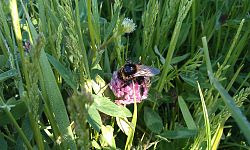

The results of a most recent study on bees reveal, that increased levels of pesticides containing neonicotinoid have an adverse effect on bees' ability to create a buzz to produce and gather pollen from crops and flowers.
There is a strong evidence that neonicotinoid pesticides can harm individual bees, but to date, there is little evidence, that it affects the whole colonies. This type of pesticide, used commonly on oilseed rape crops, reduces learning abilities and memory in bees, as well as reducing the ability to buzz, or to shake pollen, the scientists explain: "The bee lands on a flower, curls her body around the anther and grips the base with her mandibles. She then rapidly contracts the flight muscles to produce the vibration, without beating her wings." With this ability impaired, due to effects of neonicotinoids on bees, it has been found, that "the bees take less pollen back to the colonies and the colonies could be less successful, meaning there may be fewer pollinators overall."
The effects of pesticides on pollinating insects have lead to the temporary ban on certain neonicotinoid pesticides in 2013 by the EU, but this has been successfully challenged by the UK's farming organisation, the National Farmers Union (NFU), resulting in partial revocation of the ban last year to allow to spray the oilseed rape crops.
Pesticides containing neonicotinoid could have serious implications on the population of wild bee, but the agrochemical industries keep promoting their use due to it's effectiveness on crops production and price.
Campaigners and ecologists urge the British ministers to take note and if they wish to safeguard Britain's bees, they must keep the ban on use of neonicotinoid pesticides regardless of what happens with Brexit, control the way the pesticides are tested and licensed for use in agriculture.
For more information, see: